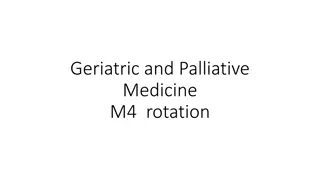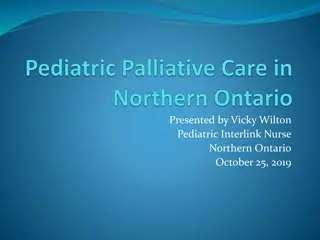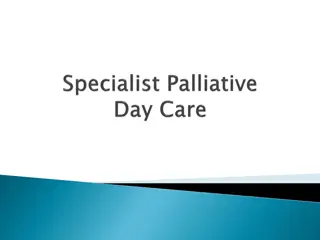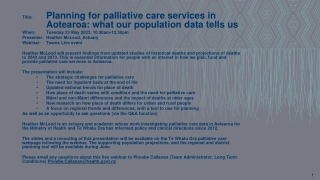
Palliative Care_ Improving Quality of Life for Patients
This comprehensive guide explores the essence of palliative care, its benefits, and how it can make a significant difference in the lives of those facing serious health challenges.
Uploaded on | 0 Views
Download Presentation

Please find below an Image/Link to download the presentation.
The content on the website is provided AS IS for your information and personal use only. It may not be sold, licensed, or shared on other websites without obtaining consent from the author. Download presentation by click this link. If you encounter any issues during the download, it is possible that the publisher has removed the file from their server.
E N D
Presentation Transcript
Palliative Care: Improving Quality of Life for Patients and Families Palliative care is a specialized approach to medical care focused on providing relief from symptoms, pain, and stress associated with serious illnesses. It is designed to improve the quality of life for both patients and their families, regardless of the stage of the illness or the need for other curative treatments. This comprehensive guide explores the essence of palliative care, its benefits, and how it can make a significant di?erence in the lives of those facing serious health challenges. What is Palliative Care? This care is a holistic approach aimed at enhancing the quality of life for patients with serious, often life-limiting illnesses. Unlike curative treatment, which seeks to eliminate the disease, it focuses on providing relief from the symptoms, pain, and emotional stress associated with the illness. It can be provided alongside curative treatment or as the main approach when curative options are no longer available.
Key Principles 1. Patient-Centered Care: This care is tailored to the individual needs of the patient. It involves understanding and addressing the patient s physical, emotional, and spiritual needs. 2. Symptom Management: The primary goal is to alleviate symptoms such as pain, nausea, fatigue, and di?culty breathing, enhancing comfort and well-being. 3. Interdisciplinary Team Approach: It is provided by a team of healthcare professionals, including doctors, nurses, social workers, chaplains, and other specialists, working collaboratively to provide comprehensive care. 4. Family Support: It extends support to families, helping them cope with the emotional and practical aspects of caring for a loved one with a serious illness. 5. Improving Quality of Life: The focus is on improving the overall quality of life, respecting the patient s preferences and values, and providing comfort and dignity. When is Palliative Care Appropriate?
It is appropriate at any stage of a serious illness, from diagnosis through treatment and beyond. It is not limited to end-of-life care but can be beneficial at any stage of the illness. Common conditions that may benefit from palliative care include: Cancer Heart failure Chronic obstructive pulmonary disease (COPD) Kidney disease Neurological disorders such as Parkinson s disease or Alzheimer s disease Advanced liver disease Benefits 1. Enhanced Symptom Relief: It o?ers advanced symptom management techniques to control pain and other distressing symptoms e?ectively. 2. Improved Communication: The care team helps facilitate open and honest communication between the patient, family, and other healthcare providers, ensuring that care decisions align with the patient s goals and preferences.
3. Emotional and Psychological Support: Addressing the emotional and psychological impact of serious illness helps patients and families cope with the stress and anxiety associated with the condition. 4. Support for Caregivers: It provides practical and emotional support for caregivers, helping them manage the demands of caregiving and maintain their own well-being. 5. Coordination of Care: The care team coordinates with other healthcare providers to ensure that all aspects of the patient s care are integrated and aligned with their overall treatment goals. Components 1. Pain and Symptom Management: Includes medications and therapies to manage pain, nausea, fatigue, and other symptoms, ensuring maximum comfort. 2. Emotional and Psychological Support: O?ers counseling, support groups, and stress-relief techniques to help patients and families cope with the emotional challenges of serious illness. 3. Spiritual Care: Provides support for spiritual and existential concerns, helping patients find meaning and comfort in their journey. 4. Nutritional Support: Assists with dietary needs and managing symptoms related to eating and digestion. 5. Care Planning: Helps with advance care planning and decision-making, including goals of care, treatment preferences, and end-of-life planning. Palliative Care vs. Hospice Care While palliative and hospice care share similar goals, they di?er in their timing and focus: Palliative Care: Can be provided at any stage of a serious illness, alongside curative treatments. It focuses on improving quality of life and managing symptoms. Hospice Care: A form of palliative care specifically for individuals who are nearing the end of life. It is typically provided when curative treatments are no longer e?ective, and the focus shifts to comfort and quality of life in the final stages of life. Accessing Its services can be accessed through various settings, including:
Hospitals: Many hospitals have dedicated palliative care teams that provide consultations and ongoing care. Outpatient Clinics: It can be provided in outpatient settings for patients who are not hospitalized. Home Care: Home-based care allows patients to receive support in the comfort of their own home. Long-Term Care Facilities: Its services can be integrated into nursing homes and other long-term care facilities. How to Initiate Palliative Care? To access palliative, discuss with your primary care physician or specialist about your needs and goals. They can provide referrals to palliative care services and help integrate this care into your overall treatment plan. It is essential to have open conversations about your preferences, concerns, and goals for care. Conclusion
Palliative care is a compassionate and comprehensive approach designed to improve the quality of life for patients with serious illnesses. By focusing on symptom relief, emotional support, and holistic care, it helps patients and their families navigate the challenges of serious illness with dignity and comfort. If you or a loved one is facing a serious health condition, consider exploring palliative care options to enhance well-being and support throughout the journey. Find practical solutions to common challenges through our insightful articles on Healthcare 360 Magazine
























